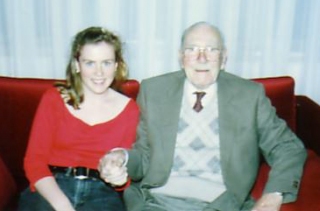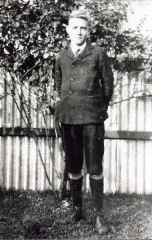Fiona’s English Project 1989 – Her Grandfather Phonse Tobin
The following is an excerpt from an English Assignment that Fiona Shine did of the life of her Grandfather Phonse Tobin in 1989. At the time he was 84. The excerpt covers his childhood years as he related them to her.
Alphonsus Vincent Tobin was born in Melbourne on the 23rd August 1905. He was a twin. The nurse asked his mother what she was going to call her twin boys and his mother’s reply was ‘this one was to be called Bernard and the other, Alphonsus’. The nurse’s reaction to this was that such a big name would kill the little child, so my Grandad was named Alphonsus. Unfortunately the name change didn’t help little Bernie for he died the next day.
Grandad’s father, Thomas Tobin, arrived in Australia on the 16th August, 1889 with his first wife, Marie Tobin. After giving birth to two children, Winifred and John, she died and he later married Alice O’Dowd. Grandad was born after his sister Molly and brother, Leo. Later, three other boys Noel, Tom and Kevin were born.
Grandad’s first vivid memory was in 1910 at nearly 5 years old. He had heard a comet being discussed at the dinner table for some weeks, without actually understanding what the fuss was about. As a child he used to sit on the veranda with his Mum and she would tell him stories. One night whilst sitting by himself, he saw an ‘unusual long tailed light or star in the heavens’. He ran in to tell his family, who came out and said that it was the comet. This comet was of course, Halley’s Comet. Grandad has since seen the Comet a second time, when he travelled back to his old house where he had originally viewed Halley’s Comet, to be filmed on video on the veranda of his house.
On Grandad’s ninth birthday, World War 1 broke out. The enlisted volunteers marched from the Victoria Barracks along City Road to the embarkation. As the weather was humid the soldiers were hot and uncomfortable in their uniforms. Noticing this, Grandad and a few of his mates decided to go into the pub and buy the men a beer with the money the men gave them. Their thoughtfulness was rewarded by tips, which was greatly appreciated by the boys.
School is not one of Grandad’s fondest memories. He had always disliked school as a child and he believed that ‘he’d learn more outside than at school’. It was this notion that caused him to wag most of his school days. One incident he recalls that contributed to his feelings about the classroom was ‘Empire Day’. This special occasion was most welcome by most students. The mayor and councillors used to visit schools and give out bags of lollies and long speeches. During the speeches, a boy next to Grandad yawned loudly. Naturally the teacher was disgusted and blamed Grandad for the rudeness. Instead of the culprit owning up, he supported the teacher, saying it was Grandad and he was punished.To pass the time while not at school, Grandad used to walk into the city and watch the Britannia movies. But of course, this cost money. Grandad had several means of obtaining his money. At the time there was a rat plague in South Melbourne. Each rat caught was rewarded by the council 3 pence, so Grandad would spend his time catching rats.
Another method of obtaining his money was by selling streamers at Port Melbourne, where the soldiers were leaving for war. He used to enjoy waving to the men as the ships disembarked from the wharf. One incident he recalls was that while waving to the troops on board the ship, an old lady approached him and asked him to whom he was waving. His instinct told him to lie which he did by replying, ‘My brother’. The old lady gave him two shillings to buy a flag; instead, he kept the money and returned home.
On another occasion, he and a mate noticed a straggling digger. Approaching him they offered to carry his bags to the ship. When they reached the ramp, an officer said to the boys not to go any further.
‘These are my lads and they have come to see me off’.
‘They cannot go any further’, the officer replied.
Their newly appointed father said, ‘Well, lads, kiss your Daddy goodbye and look after Mummy’.
He gave them two shillings each and they went on their way. Even to this day, Grandad remembers the soldier and wonders whether they were the last two kisses in his lifetime.
With his family moving to Flemington, Grandad attended a new school. He decided that he would attend school regularly, but after a couple of weeks his old urge was too strong to resist and he started wagging again. Now, instead of going to the movies or the wharves, he used to visit the Melbourne showgrounds or go to Broadmeadows.
When the teacher would query his continual absence his usual reply was ‘I was sick, Sir’. The teacher eventually wrote a note to his parents. But Grandad outsmarted the teacher, getting an older friend to write a note back. This worked a couple of times, but finally he was caught out when the teacher spoke to his parents. After being taken away from school, he received a decent belting from his father and was sent to boarding school for twelve months.
‘It must have cured me, for I never missed a day of my final year and I finished second dux of the class’.
Fiona Shine, 1989.
Return to Family Sources.


